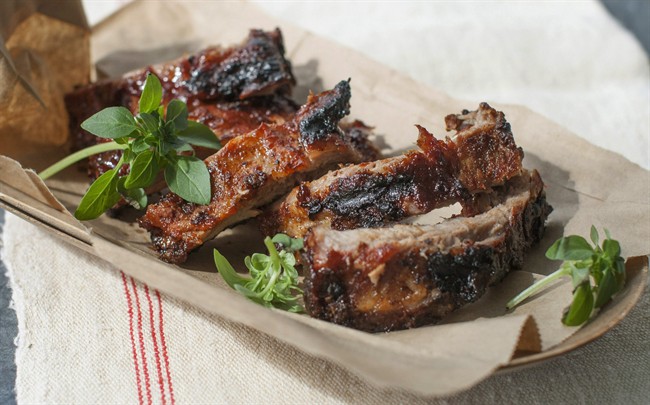TORONTO – There’s a simple rule to preventing growth of nasty bacteria at your summer cookout which can cause your stomach grief for days.

“Keep hot foods hot and cold foods cold,” says Brenda Watson, executive director of the Cambridge, Ont.-based Canadian Partnership for Consumer Food Safety Education.
The group has created harmonized food safety standards from the “farm gate to the dinner plate,” says Watson. Members of the partnership include meat and poultry producers, local health authorities and the Public Health Agency of Canada.
The first step to food safety is to make sure your hands, kitchen tools and surfaces are clean. It also helps to use separate cutting boards and knives when preparing meat and raw produce. Watson recommends preparing meat and vegetables in different areas of the kitchen to avoid cross-contamination.
READ MORE: Tips to keep your barbecue food safe
Washing raw fruits and vegetables is also key to getting rid of surface bacteria. If not rinsed thoroughly, they can be a source of E. coli – which can make you sick for up to 10 days.
When it comes to poultry, the U.K. Food Safety Board recommends that it never be washed because it contaminates water droplets which can then spread Campylobacter, a bacteria found on raw chicken, to counters, clothes and dishes. This bug can lead to the fever- and nausea-inducing illness campylobacteriosis, which is the leading cause of food-related illness in this country, according to the Public Health Agency of Canada.
One of the easiest ways of transferring bacteria is losing track of which plates and utensils have been used for raw meat. Watson advises having a clean plate ready to put meat on when you remove it from the grill to avoid cross-contamination.
Burgers in particular are breeding ground for bacteria as mixing ground meat with your favourite sauces and spices incorporates surface bacteria. The good news is you can get rid of it by cooking the meat thoroughly.
Growing up, Watson was taught to cut a little slit in a burger or steak to check if it was cooked enough to get rid of bugs, but now appearance alone is not a good enough indicator for her.
“The only way to be sure is to use a food thermometer,” says Watson.
READ MORE: Grilling gets pricey this summer as meat prices surge
She adds that to prevent cross-contamination, wash the stem of the thermometer between uses in hot soapy water.
Ground meat should reach a temperature of 71 C (160 F), steaks can range from medium-rare (63 C/145 F) to well done (77 C/170 F) and chicken pieces should be cooked to 74 C (165 F) to get rid of risks like salmonella.
Once meat is grilled, keep it hot until it’s ready to eat and don’t forget about keeping your sides heated too.
“People don’t think about the lowly baked potato,” says Watson. “Those baked potatoes need to be held in a safe temperature zone.”
Cold sides – such as salads and burger toppings like sliced tomatoes, onions and lettuce – should be kept chilled and covered at all times.
While hosting a barbecue, it can be easy to put off storing food until the end of the evening, but leftovers should be put away within two hours of being prepared since bacteria grow fastest between 4 C (40 F) and 60 C (140 F). If the food has been out longer than that, Watson recommends throwing it out.
READ MORE: 9 tips for healthy summertime barbecuing
What if your leftovers are still warm from the grill? Better to put them away rather than forgetting, Watson says.
Food should be stored at 4 C (40 F) or lower to keep it out of the “danger zone.”
“Don’t jam pack your refrigerator,” says Watson, warning that without sufficient room food may not be chilled enough to prevent bacteria growth.





Comments